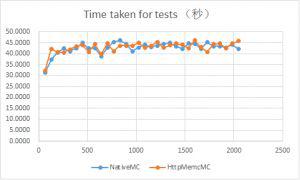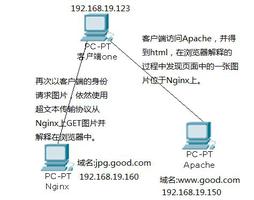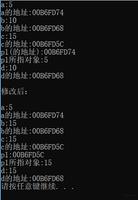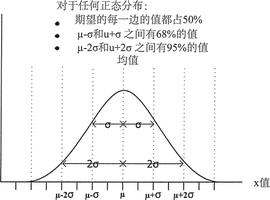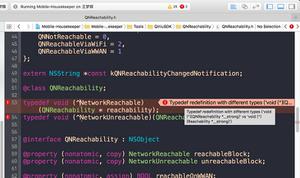Pythonimp——由代码内部访问import。

源代码: Lib/imp.py
3.4 版后已移除: imp 模块已被废弃,请改用 importlib。
本模块提供了一个接口,用于实现 import 语句的机制。这里定义了以下常量和函数:
imp.get_magic()¶Return the magic string value used to recognize byte-compiled code files
(
.pycfiles). (This value may be different for each Python version.)3.4 版后已移除: Use
importlib.util.MAGIC_NUMBERinstead.
imp.get_suffixes()¶Return a list of 3-element tuples, each describing a particular type of
module. Each triple has the form
(suffix,mode,type), where suffix isa string to be appended to the module name to form the filename to search
for, mode is the mode string to pass to the built-in
open()functionto open the file (this can be
'r'for text files or'rb'for binaryfiles), and type is the file type, which has one of the values
PY_SOURCE,PY_COMPILED, orC_EXTENSION, describedbelow.
3.3 版后已移除: Use the constants defined on
importlib.machineryinstead.
imp.find_module(name[, path])¶Try to find the module name. If path is omitted or
None, the list ofdirectory names given by
sys.pathis searched, but first a few specialplaces are searched: the function tries to find a built-in module with the
given name (
C_BUILTIN), then a frozen module (PY_FROZEN),and on some systems some other places are looked in as well (on Windows, it
looks in the registry which may point to a specific file).
Otherwise, path must be a list of directory names; each directory is
searched for files with any of the suffixes returned by
get_suffixes()above. Invalid names in the list are silently ignored (but all list items
must be strings).
If search is successful, the return value is a 3-element tuple
(file,pathname,description):
file is an open file object positioned at the beginning, pathname
is the pathname of the file found, and description is a 3-element tuple as
contained in the list returned by
get_suffixes()describing the kind ofmodule found.
If the module is built-in or frozen then file and pathname are both
Noneand the description tuple contains empty strings for its suffix and mode;
the module type is indicated as given in parentheses above. If the search
is unsuccessful,
ImportErroris raised. Other exceptions indicateproblems with the arguments or environment.
If the module is a package, file is
None, pathname is the packagepath and the last item in the description tuple is
PKG_DIRECTORY.This function does not handle hierarchical module names (names containing
dots). In order to find P.M, that is, submodule M of package P, use
find_module()andload_module()to find and load package P, andthen use
find_module()with the path argument set toP.__path__.When P itself has a dotted name, apply this recipe recursively.
3.3 版后已移除: Use
importlib.util.find_spec()instead unless Python 3.3compatibility is required, in which case use
importlib.find_loader(). For example usage of the former case,see the 例子 section of the
importlibdocumentation.
imp.load_module(name, file, pathname, description)¶Load a module that was previously found by
find_module()(or by anotherwise conducted search yielding compatible results). This function does
more than importing the module: if the module was already imported, it will
reload the module! The name argument indicates the full
module name (including the package name, if this is a submodule of a
package). The file argument is an open file, and pathname is the
corresponding file name; these can be
Noneand'', respectively, whenthe module is a package or not being loaded from a file. The description
argument is a tuple, as would be returned by
get_suffixes(), describingwhat kind of module must be loaded.
If the load is successful, the return value is the module object; otherwise,
an exception (usually
ImportError) is raised.Important: the caller is responsible for closing the file argument, if
it was not
None, even when an exception is raised. This is best doneusing a
try...finallystatement.3.3 版后已移除: If previously used in conjunction with
imp.find_module()thenconsider using
importlib.import_module(), otherwise use the loaderreturned by the replacement you chose for
imp.find_module(). If youcalled
imp.load_module()and related functions directly with filepath arguments then use a combination of
importlib.util.spec_from_file_location()andimportlib.util.module_from_spec(). See the 例子section of the
importlibdocumentation for details of the variousapproaches.
imp.new_module(name)¶Return a new empty module object called name. This object is not inserted
in
sys.modules.3.4 版后已移除: Use
importlib.util.module_from_spec()instead.
imp.reload(module)¶Reload a previously imported module. The argument must be a module object, so
it must have been successfully imported before. This is useful if you have
edited the module source file using an external editor and want to try out the
new version without leaving the Python interpreter. The return value is the
module object (the same as the module argument).
When
reload(module)is executed:Python modules' code is recompiled and the module-level code reexecuted,
defining a new set of objects which are bound to names in the module's
dictionary. The
initfunction of extension modules is not called a secondtime.
与Python中的所有的其它对象一样,旧的对象只有在它们的引用计数为0之后才会被回收。
模块命名空间中的名称重新指向任何新的或更改后的对象。
其他旧对象的引用(例如那个模块的外部名称)不会被重新绑定到引用的新对象的,并且如果有需要,必须在出现的每个命名空间中进行更新。
有一些其他注意事项:
当一个模块被重新加载的时候,它的字典(包含了那个模块的全区变量)会被保留。名称的重新定义会覆盖旧的定义,所以通常来说这不是问题。如果一个新模块没有定义在旧版本模块中定义的名称,则将保留旧版本中的定义。这一特性可用于作为那个模块的优点,如果它维护一个全局表或者对象的缓存 —— 使用
try语句,就可以测试表的存在并且跳过它的初始化,如果有需要的话:try:
cache
exceptNameError:
cache={}
It is legal though generally not very useful to reload built-in or dynamically
loaded modules, except for
sys,__main__andbuiltins.In many cases, however, extension modules are not designed to be initialized
more than once, and may fail in arbitrary ways when reloaded.
If a module imports objects from another module using
from...import..., callingreload()for the other module does notredefine the objects imported from it --- one way around this is to re-execute
the
fromstatement, another is to useimportand qualifiednames (module.*name*) instead.
如果一个模块创建一个类的实例,重新加载定义那个类的模块不影响那些实例的方法定义———它们继续使用旧类中的定义。对于子类来说同样是正确的。
在 3.3 版更改: Relies on both
__name__and__loader__being defined on the modulebeing reloaded instead of just
__name__.3.4 版后已移除: Use
importlib.reload()instead.
The following functions are conveniences for handling PEP 3147 byte-compiled
file paths.
3.2 新版功能.
imp.cache_from_source(path, debug_override=None)¶Return the PEP 3147 path to the byte-compiled file associated with the
source path. For example, if path is
/foo/bar/baz.pythe returnvalue would be
/foo/bar/__pycache__/baz.cpython-32.pycfor Python 3.2.The
cpython-32string comes from the current magic tag (seeget_tag(); ifsys.implementation.cache_tagis not defined thenNotImplementedErrorwill be raised). By passing inTrueorFalsefor debug_override you can override the system's value for__debug__, leading to optimized bytecode.path need not exist.
在 3.3 版更改: If
sys.implementation.cache_tagisNone, thenNotImplementedErroris raised.3.4 版后已移除: Use
importlib.util.cache_from_source()instead.在 3.5 版更改: The debug_override parameter no longer creates a
.pyofile.
imp.source_from_cache(path)¶Given the path to a PEP 3147 file name, return the associated source code
file path. For example, if path is
/foo/bar/__pycache__/baz.cpython-32.pycthe returned path would be/foo/bar/baz.py. path need not exist, however if it does not conformto PEP 3147 format, a
ValueErroris raised. Ifsys.implementation.cache_tagis not defined,NotImplementedErroris raised.在 3.3 版更改: Raise
NotImplementedErrorwhensys.implementation.cache_tagis not defined.3.4 版后已移除: Use
importlib.util.source_from_cache()instead.
imp.get_tag()¶Return the PEP 3147 magic tag string matching this version of Python's
magic number, as returned by
get_magic().3.4 版后已移除: Use
sys.implementation.cache_tagdirectly startingin Python 3.3.
The following functions help interact with the import system's internal
locking mechanism. Locking semantics of imports are an implementation
detail which may vary from release to release. However, Python ensures
that circular imports work without any deadlocks.
imp.lock_held()¶Return
Trueif the global import lock is currently held, elseFalse. On platforms without threads, always returnFalse.On platforms with threads, a thread executing an import first holds a
global import lock, then sets up a per-module lock for the rest of the
import. This blocks other threads from importing the same module until
the original import completes, preventing other threads from seeing
incomplete module objects constructed by the original thread. An
exception is made for circular imports, which by construction have to
expose an incomplete module object at some point.
在 3.3 版更改: The locking scheme has changed to per-module locks for
the most part. A global import lock is kept for some critical tasks,
such as initializing the per-module locks.
3.4 版后已移除.
imp.acquire_lock()¶Acquire the interpreter's global import lock for the current thread.
This lock should be used by import hooks to ensure thread-safety when
importing modules.
Once a thread has acquired the import lock, the same thread may acquire it
again without blocking; the thread must release it once for each time it has
acquired it.
On platforms without threads, this function does nothing.
在 3.3 版更改: The locking scheme has changed to per-module locks for
the most part. A global import lock is kept for some critical tasks,
such as initializing the per-module locks.
3.4 版后已移除.
imp.release_lock()¶Release the interpreter's global import lock. On platforms without
threads, this function does nothing.
在 3.3 版更改: The locking scheme has changed to per-module locks for
the most part. A global import lock is kept for some critical tasks,
such as initializing the per-module locks.
3.4 版后已移除.
The following constants with integer values, defined in this module, are used
to indicate the search result of find_module().
imp.PY_SOURCE¶The module was found as a source file.
3.3 版后已移除.
imp.PY_COMPILED¶The module was found as a compiled code object file.
3.3 版后已移除.
imp.C_EXTENSION¶The module was found as dynamically loadable shared library.
3.3 版后已移除.
imp.PKG_DIRECTORY¶The module was found as a package directory.
3.3 版后已移除.
imp.C_BUILTIN¶The module was found as a built-in module.
3.3 版后已移除.
imp.PY_FROZEN¶The module was found as a frozen module.
3.3 版后已移除.
class
imp.NullImporter(path_string)¶The
NullImportertype is a PEP 302 import hook that handlesnon-directory path strings by failing to find any modules. Calling this type
with an existing directory or empty string raises
ImportError.Otherwise, a
NullImporterinstance is returned.Instances have only one method:
find_module(fullname[, path])¶This method always returns
None, indicating that the requested module couldnot be found.
在 3.3 版更改:
Noneis inserted intosys.path_importer_cacheinstead of aninstance of
NullImporter.3.4 版后已移除: Insert
Noneintosys.path_importer_cacheinstead.
例子¶
The following function emulates what was the standard import statement up to
Python 1.4 (no hierarchical module names). (This implementation wouldn't work
in that version, since find_module() has been extended and
load_module() has been added in 1.4.)
importimpimportsys
def__import__(name,globals=None,locals=None,fromlist=None):
# Fast path: see if the module has already been imported.
try:
returnsys.modules[name]
exceptKeyError:
pass
# If any of the following calls raises an exception,
# there's a problem we can't handle -- let the caller handle it.
fp,pathname,description=imp.find_module(name)
try:
returnimp.load_module(name,fp,pathname,description)
finally:
# Since we may exit via an exception, close fp explicitly.
iffp:
fp.close()
以上是 Pythonimp——由代码内部访问import。 的全部内容, 来源链接: utcz.com/z/508150.html


